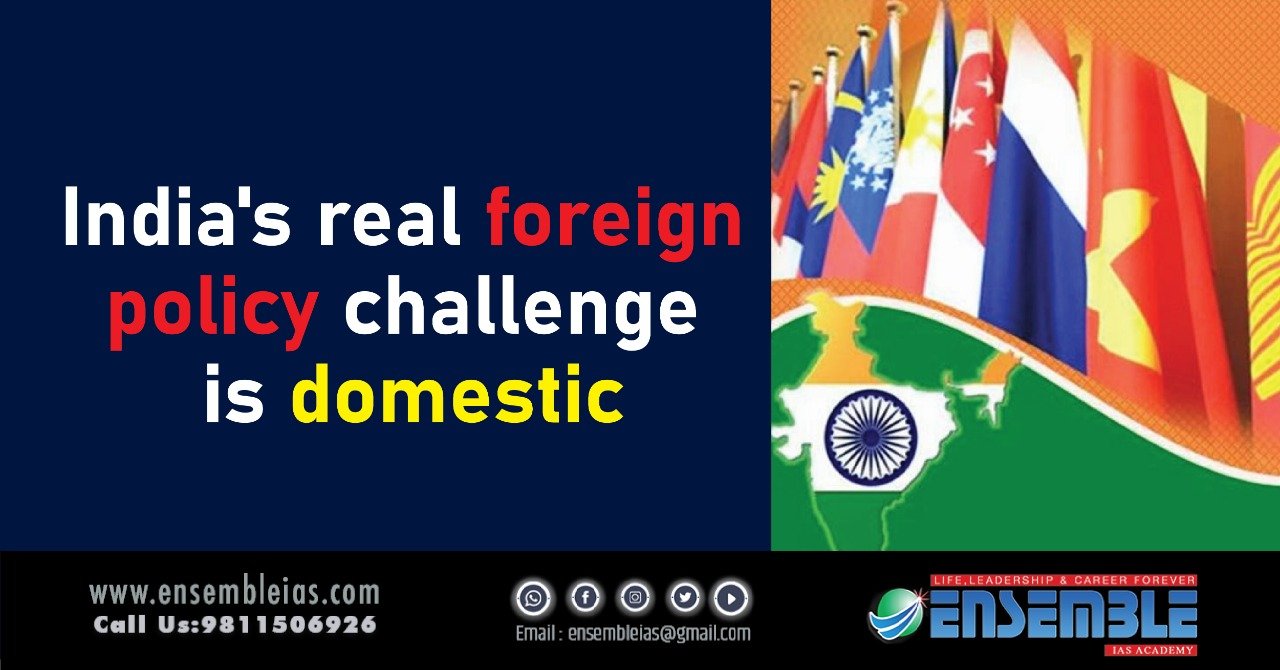India’s real foreign policy crisis is domestic: The deepening reputational damage is also depleting national resources needed for effective external relations, but the real issue here is a question for India’s polarised citizenry — will it buy into the siege mentality or will it reflect and ask tough questions of the executive
To buy our online courses: Click Here
From January to March, “Vaccine Maitri”. In late-April, an appeal to the world for help as India struggles to manage its most serious crisis since Independence. New Delhi’s international position may have never turned more dramatically. But here is the key question — what is the larger impact of the unfolding disaster on foreign policy?
The assistance offered by nations across the globe, including neighbours such as Bhutan and Bangladesh, is heartening. A non-interventionist posture coupled with constant diplomatic outreach to countries across the world is paying off. As is the policy of cultivating diaspora relations.
India has accepted aid after 16 years. External affairs minister S Jaishankar would like it to be described as friendship. This semantic quibble is understandable as the establishment seeks to recast reality for domestic consumption. But there is absolutely no shame in seeking aid in distress. India has helped other nations in need and now they are reciprocating. Some assistance is motivated by expected future gains, but no community is altruistic. The international community is no exception.
The initial American hesitation in lending assistance led critics at home to warn New Delhi of over-reliance on Washington. While the United States (US) has come through substantially, the hesitation, coming against the backdrop of other points of friction, reveals some real limits to the relationship. Agreements outside of a broadly common China strategy will take work. Further, “the spirit of the Quad” was celebrated in March. It didn’t prevent Australia from banning the return travel from India of about 9,000 of its own citizens, mostly of Indian origin.
Meanwhile, New Delhi has kept up its global game. Relations with the United Kingdom and Russia have been upgraded. A landmark summit meeting with the European Union saw a decision to resume negotiations for a free-trade agreement stalled since 2013.
China’s control over the pandemic means that it is not tied down at home. Its top leader has offered cooperation and support. But Beijing’s efforts to move South Asia within its geopolitical orbit continue. It recently convened a virtual conference of the region’s foreign ministers on vaccine cooperation. It also remains advantageously placed in eastern Ladakh. Overall, China enjoys a favourable balance in the bilateral set-up. Its gestures of solidarity notwithstanding, New Delhi must remain watchful.
There is also the issue of international reputation. As trustee of India’s international image and standing, New Delhi continues to fare poorly. There is now a set international narrative about the decline of India’s democracy, its majoritarian public culture and increasing bad governance. New Delhi feels agitated, but its actions often only strengthen a siege mentality. The deepening reputational damage is also depleting national resources needed for effective external relations, but the real issue here is a question for India’s polarised citizenry — will it buy into the siege mentality or will it reflect and ask tough questions of the executive.
India’s real foreign policy crisis is domestic: India’s core challenges to effective foreign policy have always come from within, and here we see damage.
First, there is the flawed governance of the pandemic. The executive prematurely declared success in tackling the challenge and abandoned its role on pandemic-appropriate public behaviour. As the scale of infections grows, lives of people within the country are lost while of those outside endangered. Because of the size of its population, currently at about 18% of humanity, the pandemic tsunami has turned us into a source of global anxiety.
The executive’s approach hasn’t helped. It has sought to weave an acceptable narrative rather than accept responsibility. You can’t fix what you don’t accept is broken. Our governance is marked by centralisation of authority and federalisation of responsibility. This approach has many vices; delay and chaos are the smallest of them. The larger the number of infected bodies, the higher the probability of mutation. This makes the world anxious because new strains may impact vaccine effectiveness. True, ours is not the only national population body among whom the virus may mutate for the worse. But as Dr Ashish Jha of Brown University has conjectured, in the Kumbh Mela, we may have organised “the biggest super spreader event in the history of this pandemic”. All this is bad governance. It has rendered the body politic incohesive and weak.
Second, under-reporting of Covid-19 deaths and under-testing mean that even approximately accurate figures of the scale of the crisis may never be known. This feeds into the larger problem of data credibility and transparency that has marred public policy in recent years. External stakeholders have expressed concern over unreliable fiscal, unemployment and internal migration figures because they weaken policy. Dodgy pandemic numbers mar national and global public health action, which needs credible data to determine disease dynamics. Both the Centre and the states owe this to their people as well as the world.
Finally, the catastrophe has unfolded on Prime Minister Narendra Modi’s watch. His domestic standing may remain unscathed, but as controversies going back the past couple of years pile up, his position among foreign leaders of consequence diminishes. Nations compete for relative gains in international politics, and a weakened leader is more attractive than one who is weak from the start.
Also Read: On the edge: On international pressure on Israel
A combination of restrictions in the flow of information and censorship means that we may never know how this factor would impact Indian interests, but impact it very likely will.
(India’s real foreign policy crisis is domestic:)




